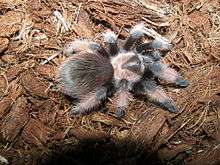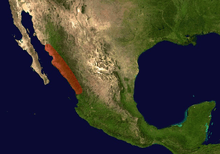Brachypelma emilia
The Mexican redleg or red-legged tarantula (Brachypelma emilia) is a species of terrestrial tarantula closely related to the famous Mexican redknee tarantula. Like the redknee it is a docile tarantula and popular in the pet trade. It is slow growing and, like many tarantulas, females can live for decades.
| Brachypelma emilia | |
|---|---|
 | |
| Mexican redleg tarantula | |
| Scientific classification | |
| Kingdom: | Animalia |
| Phylum: | Arthropoda |
| Subphylum: | Chelicerata |
| Class: | Arachnida |
| Order: | Araneae |
| Infraorder: | Mygalomorphae |
| Family: | Theraphosidae |
| Genus: | Brachypelma |
| Species: | B. emilia |
| Binomial name | |
| Brachypelma emilia | |
 | |
| Distribution of B. emilia. | |
| Synonyms[1] | |
| |
Description
The Mexican redleg also known as the red-legged tarantula has a dark-colored body with the second joint of its legs being pink, red or orange. Its carapace is light colored with a distinctive black triangle at the front. Following moulting, the colors are more pronounced.
An adult female has a body roughly 65 mm long, with a legspan of 12.5 cm, and a weight of approximately 15 to 16 grams.
Conservation
All species of Brachypelma were placed on CITES Appendix II in 1994, thus restricting trade.[2] Nevertheless, large numbers of tarantulas caught in the wild continue to be smuggled out of Mexico, including species of Brachypelma.[3]
In captivity
The Mexican redleg is a mostly docile species, perhaps more so even than the redknee. That, coupled with its coloration, and impressive size, makes it a very popular pet species. As such it is considered to be threatened by capture for sale to the pet trade.[4]
It is very reluctant to bite when distressed, but possesses urticating hair and will flick these if it feels threatened.
References
- "Taxon details Brachypelma emilia (White, 1856)". World Spider Catalog. Natural History Museum Bern. Retrieved 2017-09-29.
- "Brachypelma smithi (F. O. Pickard-Cambridge, 1897): Documents". Species+. UNEP-WCMC & CITES Secretariat. Retrieved 2017-09-22.
- Mendoza, J. & Francke, O. (2017). "Systematic revision of Brachypelma red-kneed tarantulas (Araneae: Theraphosidae), and the use of DNA barcodes to assist in the identification and conservation of CITES-listed species". Invertebrate Systematics. 31 (2): 157–179. doi:10.1071/IS16023.
- "Mexican redleg tarantula (Brachypelma emilia)". Wildscreen Arkive. Wildscreen. Archived from the original on 2015-07-14. Retrieved 6 July 2015.
External links
- Hijmensen, Eddy (2011). "Brachypelma emilia". mantid.nl. Retrieved 2017-10-05. (Photographs taken in the wild.)